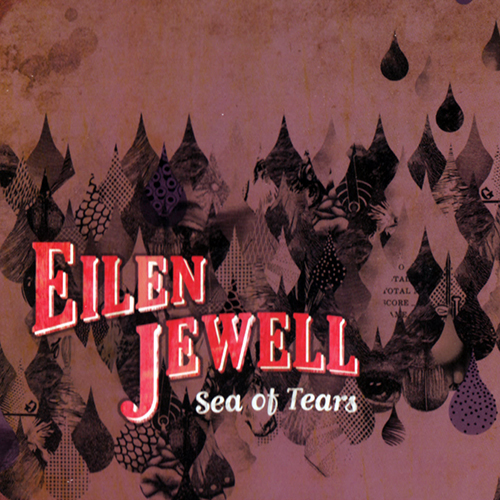EILEN JEWELL : SEA OF TEARS
- Rain Roll In
- Sweet Rose
- Shakin' All Over
- Sea Of Tears
- Fading Memory
- Nowhere In No Time
- I'm Gonna Dress In Black
- One Of Those Days
- Final Hour
- The Darkest Day
- Everywhere I Go
- Codeine Arms
Label : Signature Sounds
Release Date : April 2009
Length : 38:50
Review (AllMusic) : There is nothing wrong with providing retro music as long as the artist does it convincingly, and singer/songwriter Eilen Jewell is quite convincing on Sea of Tears. The era that she sets out to re-create on this 2009 release is the 1960s; this is '60s-flavored roots rock with elements of '60s blues (Chess Records' electric Chicago blues is an obvious influence), '60s soul and '60s country. And not only does Sea of Tears emulate the '60s stylistically -- even Jewell's production recalls that decade. But Jewell's ability to make a 2009 release sound like it could have been recorded in 1967 or 1968 wouldn't mean much if she didn't know how to get her points across emotionally; Jewell is quite expressive, which isn't to say that she is an aggressive or forceful type of vocalist. Actually, Jewell's vocals are subtle, understated, and relaxed, but that doesn't make her any less expressive on moody, melancholy originals such as "Codeine Arms," "Rain Roll In," and "Fading Memory." Jewell, in fact, is as melancholy on her own material as she is on memorable performances of "I'm Gonna Dress in Black" (a brooding gem that Van Morrison performed when he was a member of Them in the '60s) and Loretta Lynn's "The Darkest Day." Sea of Tears is a highly appropriate title for this 38-minute CD, which is as dark as it is compelling. A lot of great art has been the result of darker emotions, and darker emotions certainly yield excellent results for Jewell on Sea of Tears.
Review (Pop Matters) : Having worked up a reputation as an earnest folkie the past few years, Eilen Jewell’s Sea of Tears is an attempt to move beyond the identity captured on earlier records like 2006’s Boundary County and 2007’s Letters from Sinners and Strangers, towards a more guitar-heavy, British Invasion-based sound. (Jewell both tips her hat and shows her hand with covers of Johnny Kid and the Pirates’ proto-Beat Boom hit “Shakin’ All Over” and Them’s “I’m Gonna Dress in Black”.) Jewell’s reliably-solid band, featuring some inspired guitar playing by Jerry Miller, moves with lithe confidence, and, for her part, Jewell is a excellent singer, especially apt at channeling the trembly vulnerability of a barroom chanteuse. Unfortunately, the songs don’t always deserve the voice. Critics sometimes praise Jewell for creating songs that feel familiar. If that’s a virtue, it’s stretched to its breaking point in several spots on Sea of Tears. “Nowhere in No Time”, for instance, opens with a long string of clichés: “Well the shape I’m in / I’m a sight for sore eyes / Been wrung out and hung out / Strung out on a line”. Country music depends on these kinds of common phrases but the best of country music makes us reevaluate the potential meanings of ordinary language. These songs only do that occasionally. And when “tumbleweeds they tumble” and “dust clouds roll” so earnestly, nostalgia lurks dangerously near. “One of Those Days” rhymes “rusted .44” and a “back door”, and elsewhere the central props include a “shotgun”, “codeine”, and a “tin shack” — this is all fine but it walks a thin line between the familiar and the obvious. In other words, these aren’t the fluid blues tropes that show up in the songs of Gillian Welch and M. Ward (occasionally) or Bob Dylan (frequently), but something less substantial. Indeed, the images strain towards an effect –“authenticity”, perhaps — that remains elusive. Effect is traded for affect and, since the language lacks ballast, it too quickly loses its texture. To a lesser extent, this same issue strains the music as well. In so carefully working to conjure up the mood of the mid-century, something vital is very nearly lost. When everything coheres, however, as it does on the title track, Jewell’s vision becomes clear: all the retro energy stops servicing simulacra and acts as a map to something distinctly personal. It comes as a surprise, then, that the most memorable moment on Sea of Tears happens during a cover song, where Jewell beautifully reimagines Loretta Lynn’s “The Darkest Day” as a smoky shuffle with guitar lines that straddle the Bakersfield snap of Don Rich and the funky Memphis grime of Steve Cropper. Overall, it might be enough just to hear Jewell sing. Her clear-throated crossing of jazz phrasing and honky tonk swell is always pleasant and frequently evocative. The record may not show as many sides of the singer as she had hoped, but what we do see is plenty worthy in its own right: Sea of Tears is certainly worth your time and — in this era of “free” music — money, but the breakthrough record is still in the offing for Eilen Jewell.
